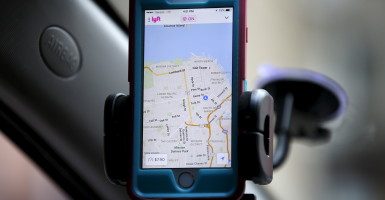Late last year, the city council in Austin, Texas, passed a new law requiring ride-sharing companies like Uber and Lyft to replace their current background check systems with costly fingerprint-based checks when vetting potential drivers. The mandate, ostensibly promulgated in the name of public safety, now threatens to drive ride-sharing services out of the city.
Austin residents, it seems, do not want to be left hanging. Twenty-five thousand citizens have rejected the city council’s action, signing a petition to force the council to withdraw its ordinance—or spend up to half a million of taxpayers’ money to conduct a special election in a bid to uphold its new regulation.
In response to the outcry by citizens, Austin Mayor Steve Adler proposed an alternative ordinance that would not compel fingerprinting. Instead, Austin would incentivize its use by offering special privileges to drivers who submit to a fingerprint background check, such as access to areas currently off-limits to non-taxi drivers.
Austin’s city council, however, wasn’t having any of it. On Feb. 11, the city council rejected not just the petition, but Adler’s proposed ordinance as well. This means that issue will now go before voters this May.
The present debate is a step backwards for Austin. In October 2014, the Austin city council voted to legalize Transportation Network Companies (TNCs), including ride-sharing companies like Uber and Lyft. Like in other cities, these services are now delivering reliable transportation options at a lower cost than their taxicab competitors.
The lack of fingerprint-based background checks does not seem to have dissuaded Austin’s residents from hitching rides with Uber or Lyft drivers, and with good reason: These companies already employ their own background check processes, and there is scant evidence to suggest that a fingerprint-based system will be demonstrably superior.
What do these company-created checks look like? Uber uses a service known as Checkr, a nationally accredited company verified by the National Association of Professional Background Screeners. Checkr does not use fingerprinting to conduct its background checks, relying instead on a Social Security number to search through national databases to identify prior criminal records as well as driving violations. Lyft has adopted similar practices using a third-party system that checks both national and state databases, and “when necessary, local courthouse record checks.”
On the margins, a fingerprint-based system—where a full set of prints must be recorded and sent to be processed by multiple national registries such as the FBI sex offender registry—may catch a driver truly determined to obscure his past infractions through forged documents and a false identity. But no system is perfect, and fingerprint-based checks have their share of issues.
What’s more, unlike taxi services, background checks are not the only means these companies employ to screen their drivers. Both Uber and Lyft employ systems that allow drivers and riders to rate one another. When a particular driver’s aggregate score falls below a certain threshold, they are removed from the platform. Even better, a driver’s rating and personal information are all visible to riders before they even set foot in the car, giving them a far better picture of who they are doing business with than any taxi.
Austin evidently finds these systems inadequate, and wants to impose its own preference for fingerprinting on the ride-sharing industry. Such regulatory micromanagement is a holdover from the taxi industry, which has been—and largely still is—under the more or less direct control of bureaucratic entities for the past eighty years. Such tight control makes little economic sense and has helped to calcify the taxi service, leaving it vulnerable to innovative disrupters like Uber and Lyft. Cities should not repeat the mistakes of the past and extend anachronistic regulatory edicts to the new arrivals. Markets will reward those companies that take safety seriously and punish those that do not.
Requiring background checks of drivers is certainly within a city government’s regulatory purview. There is a clear link, after all, between a regulation designed to ensure that violent felons do not become drivers and the safety and welfare of the general public. Is it necessary, however, for the city to specify the exact manner in which this check is done, with all the attendant burdens and costs such mandates entail? We would argue “no,” and it would appear that a great many of Austin’s residents agree.
Background checks are the latest volley from city governments attempting to prevent ride-sharing from expanding, or requiring that they do so only on bureaucrats’ terms. Many cities, such as Chicago and, indeed, Austin, initially declared ride-sharing illegal before bowing to public pressure to let the newcomers into the market.
New York City has become the poster child of obstinacy, having tried repeatedly to legislate or regulate ride-sharing out of existence, most recently by baselessly blaming the services for Manhattan’s congestion.
There is light at the end of the tunnel, however, as many cities and states have begun to pass laws that allow ride-sharing companies to operate within them. Now that some governments are beginning to warm to ride-sharing, they need to combat their own preferences for regulations that place unnecessary and undue burdens on innovators and entrepreneurs.































